May is the beginning of the rainy season in Nicaragua. It’s also the month that many of Sustainable Harvest®’s Nicaraguan micro-lots ship, and those coffees are now arriving in the United States.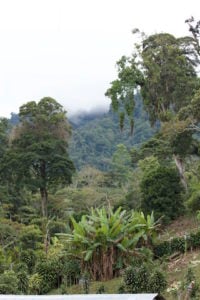
Typically, the dry Nicaraguan summer starts in November. Six months later in May, the sky clouds over again and water begins to fall—rivers rise, volcanic lakes fill, and coffee trees flower. This rainy season triggers the entire coffee production cycle. After months of stress and heat, coffee trees blossom. For the next six months, the trees rely on rainfall to support bean development.
However, this closing cycle has not proceeded with its typical regularity in the last two years: Nicaragua has been in a severe drought, directly related to the effects of El Niño. As Pacific temperatures have risen, Nicaragua has had less rainfall. This dryness has created a slew of problems for coffee production and for farming communities.
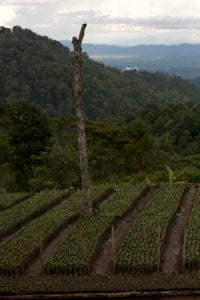 The Food and Agriculture Organization of the United Nations (FAO) named Nicaragua—along with neighbors Guatemala, El Salvador, and Honduras—a high priority for food relief efforts as a result of drought in 2015. Drought increases poverty and food shortages in farming communities as crops wither, plant cycles are interrupted, and food prices soar.
The Food and Agriculture Organization of the United Nations (FAO) named Nicaragua—along with neighbors Guatemala, El Salvador, and Honduras—a high priority for food relief efforts as a result of drought in 2015. Drought increases poverty and food shortages in farming communities as crops wither, plant cycles are interrupted, and food prices soar.
Drought upsets all agricultural production. For annual crops, which need to be sown every year, drought can cause the seeds to die in the ground and never sprout. This is particularly problematic for food crops such as rice and beans. In addition, shortages cause prices of basic food items to skyrocket.
Coffee, however, is a perennial. Coffee trees are affected by the lack of soil nutrients and water shortages but still produce more or less regular yields. Without proper nutrition, though, beans develop fewer sugars. This results in potentially dusty or grain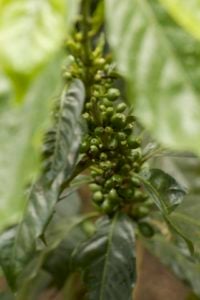 y flavors in the cup. Because of these off-flavors, a smaller amount of coffee makes the specialty-grade cut. More coffee is designated commodity, and the overall availability of specialty coffee falls.
y flavors in the cup. Because of these off-flavors, a smaller amount of coffee makes the specialty-grade cut. More coffee is designated commodity, and the overall availability of specialty coffee falls.
For specialty coffee farmers, the costs of drought are high. Essentially, their yield of specialty coffee decreases—they have less coffee that can earn a higher price for quality or that qualifies for social premiums from sustainability certifications. This combined with higher food prices can be devastating for coffee farmers.
This year, we have seen the effects of drought on Nicaraguan coffee farmers. We’ve worked closely with cooperatives so that lots are meticulously segmented, cupped, and separated again according to flavor profile. This is labor intensive, and it tests the strength and organization of cooperatives.
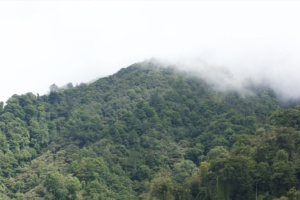 We’ve also discovered hidden gems grown in unique microclimates created by the unusual weather patterns. This year, Sustainable Harvest® is showcasing micro-lot coffees from Henry Hueck’s farm Rama Café, as well as from Finca La Cascada, and Finca Santa María de Lourdes. By using honey and natural processes, the farmers of these coffees have preserved extraordinary sugars and fruit flavors that highlight the best of Nicaragua.
We’ve also discovered hidden gems grown in unique microclimates created by the unusual weather patterns. This year, Sustainable Harvest® is showcasing micro-lot coffees from Henry Hueck’s farm Rama Café, as well as from Finca La Cascada, and Finca Santa María de Lourdes. By using honey and natural processes, the farmers of these coffees have preserved extraordinary sugars and fruit flavors that highlight the best of Nicaragua.
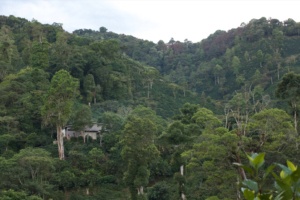 Thankfully, the rains began to fall in Nicaragua about a month ago. As I write this, it has rained three days on end all over the country. People from the city to the countryside are happy that after two straight dry years, we’re finally having a proper winter. It’s like a quenching drink after hours of parched thirst. Coffee trees are blooming, and another cycle has begun. Coffees from Nicaragua are landing in the United States now. For all of us who depend on coffee for our livelihoods, we have hope that this will be an excellent year.
Thankfully, the rains began to fall in Nicaragua about a month ago. As I write this, it has rained three days on end all over the country. People from the city to the countryside are happy that after two straight dry years, we’re finally having a proper winter. It’s like a quenching drink after hours of parched thirst. Coffee trees are blooming, and another cycle has begun. Coffees from Nicaragua are landing in the United States now. For all of us who depend on coffee for our livelihoods, we have hope that this will be an excellent year.
For more information about our new Nicaraguan coffees, email trade@sustainableharvest.com and subscribe to our newsletter below.



.png)
